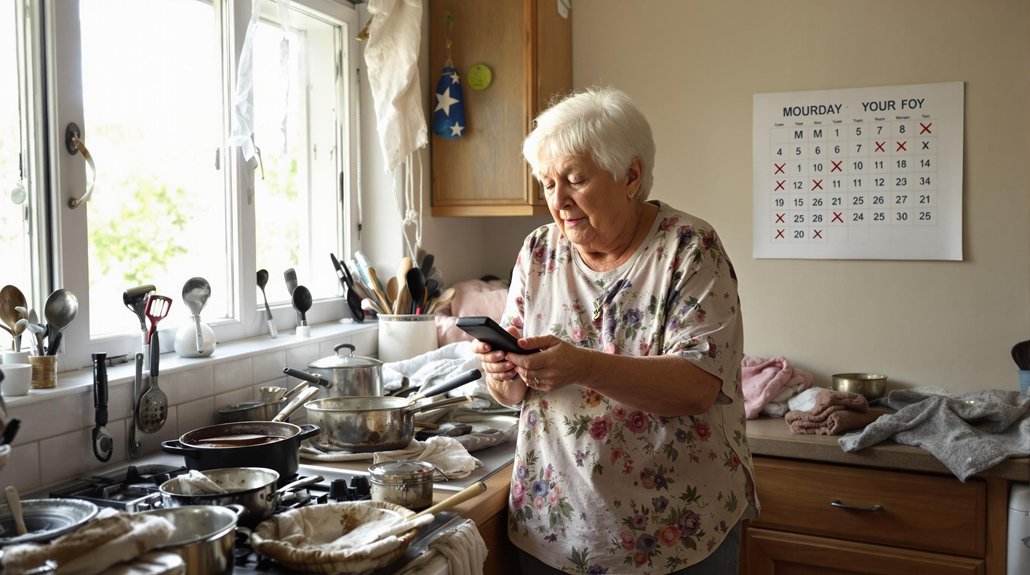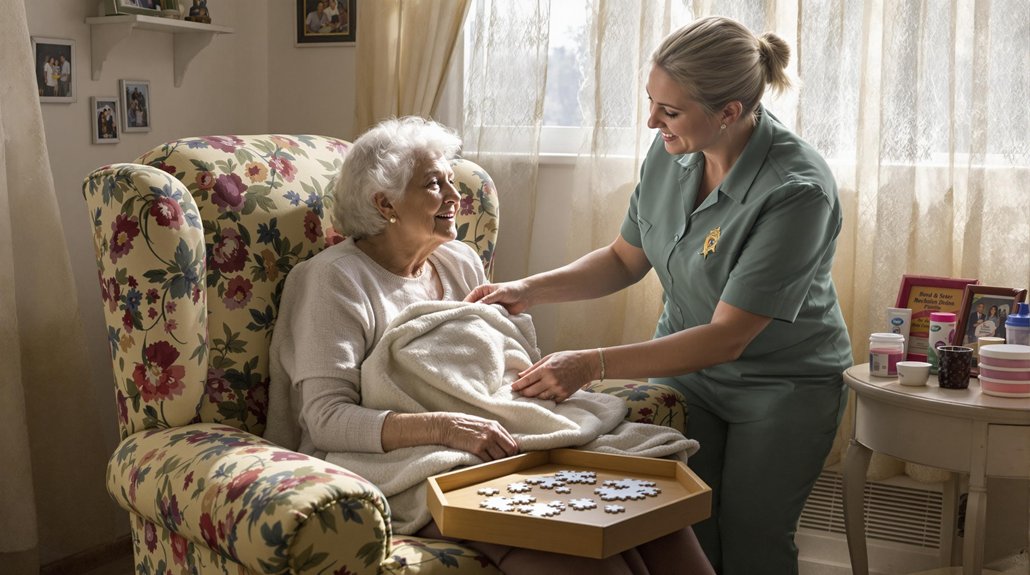When caring for someone with dementia, you’ll face three major challenges: managing unpredictable behavioral changes that can include confusion and personality shifts, dealing with the physical toll of round-the-clock care that leads to exhaustion and potential injury, and handling the emotional strain of watching your loved one’s decline while juggling daily medical and safety responsibilities. Understanding these challenges and learning effective coping strategies will help you provide better care while protecting your own wellbeing.
Understanding Behavioral Changes in Dementia Patients
When caring for someone with dementia, understanding their behavioral changes becomes essential for providing effective care. You’ll notice shifts in their personality, emotions, and reactions to everyday situations. Learning to identify behavioral triggers helps you anticipate and manage challenging moments before they escalate.
Your loved one may become agitated by simple changes in routine, unfamiliar environments, or even normal daily activities like bathing. By developing effective coping strategies, you can better respond to these situations.
Watch for patterns in their behavior, such as increased confusion during specific times of day or anxiety in crowded spaces. Keep a log of these observations to help you adjust your caregiving approach.
Remember that their reactions aren’t personal – they’re symptoms of the disease affecting their brain function.
Structured routines and memory exercises provided by trained caregivers can help minimize disorientation and confusion throughout the day.
The Physical Toll of Round-the-Clock Care
As you provide constant care for a dementia patient, your body faces significant physical demands that can quickly lead to exhaustion. The round-the-clock nature of caregiving creates intense physical challenges that you’ll need to manage carefully to maintain your own health and ability to serve effectively.
Caring for dementia patients demands immense physical stamina. Without proper self-care, caregiver burnout becomes an inevitable reality.
- Lifting and transferring patients can strain your back, shoulders, and knees.
- Sleep deprivation from nighttime wandering and disrupted rest patterns affects your coordination.
- Physical exhaustion from constant monitoring leaves you vulnerable to illness.
- Repetitive tasks like bathing and dressing create muscle fatigue and joint stress.
- Limited opportunities for exercise and self-care compound physical strain.
Understanding these physical demands helps you recognize when you need support. Don’t hesitate to ask for help or use assistive devices – protecting your body guarantees you can continue providing quality care. Respite care services can provide essential breaks to help caregivers recover from the physical demands of memory care while ensuring patients maintain their routine.
Emotional Burnout and Caregiver Stress
Though physical demands take their toll, the emotional weight of caring for someone with dementia can feel overwhelming. You’ll face heart-wrenching moments as you watch your loved one’s memories and personality gradually slip away. Building emotional resilience becomes vital for maintaining your well-being.
| Common Stressors | Impact | Stress Management |
|---|---|---|
| Memory Loss | Grief & Loss | Regular Breaks |
| Personality Changes | Frustration | Support Groups |
| Unpredictable Behavior | Anxiety | Self-Care Routine |
You’ll need effective stress management strategies to sustain your caregiving journey. When you’re feeling drained, remember that seeking help isn’t a sign of weakness – it’s a necessary step to remain an effective caregiver. Consider joining support groups where you can share experiences with others who understand your challenges. Taking care of your emotional health guarantees you can continue providing compassionate care. Respite care services can provide essential breaks to help prevent family caregiver exhaustion.
Creating a Safe Home Environment
Since dementia affects spatial awareness and judgment, creating a secure home environment becomes essential for both the patient and caregiver’s safety.
You’ll need to make safe modifications throughout the home to prevent accidents and guarantee your loved one can navigate spaces confidently.
- Install handrails in bathrooms, hallways, and stairways for fall prevention
- Remove or secure loose rugs, electrical cords, and other tripping hazards
- Add adequate lighting, including motion-sensor night lights in bedrooms and bathrooms
- Lock away dangerous items like medications, cleaning supplies, and sharp objects
- Use childproof locks on cabinets containing hazardous materials and place visual cues or labels on important doors
These adjustments will help maintain independence while protecting your loved one from potential accidents, giving you greater peace of mind as a caregiver.
Establishing structured daily routines is crucial for Alzheimer’s and dementia patients to help maintain their sense of security and emotional well-being.
Managing Daily Medical Responsibilities
Managing medications and daily medical care for someone with dementia requires careful organization and vigilance. You’ll need to establish a reliable medication management system to guarantee your loved one takes the right medications at the correct times. Consider using pill organizers, alarms, or smartphone apps to maintain consistency.
Routine scheduling of medical appointments becomes increasingly complex as the disease progresses. You’ll need to coordinate with multiple healthcare providers, track symptoms, and maintain detailed records of medications, behaviors, and health changes.
It’s vital to monitor for side effects and potential drug interactions, especially if your loved one sees different specialists. You must also stay alert to changes in their ability to swallow medications or follow treatment instructions, adapting your approach as needed while keeping their healthcare team informed. Pharmacy-based interventions can help optimize treatment plans and ensure medication safety for dementia patients.
Balancing Personal Life With Caregiving Duties
Beyond the day-to-day medical responsibilities, caregivers often struggle to maintain their own personal lives while caring for someone with dementia. Time management becomes vital as you balance caregiving duties with your own needs and relationships.
Setting personal boundaries helps prevent burnout while ensuring quality care for your loved one.
- Schedule regular breaks to recharge and maintain your physical and emotional health
- Delegate tasks to family members or professional caregivers when possible
- Maintain connections with friends and continue pursuing hobbies you enjoy
- Set realistic expectations about what you can accomplish each day
- Join support groups to connect with others facing similar challenges
Remember that taking care of yourself isn’t selfish – it’s essential for providing sustainable, effective care.
Self-care is not self-indulgence when you’re a caregiver – it’s the foundation that enables you to care for others effectively.
You’ll be better equipped to help your loved one when you maintain balance in your own life.
Communication Strategies for Dementia Care
Communication with dementia patients presents unique challenges that require specific strategies and patience.
You’ll need to adapt your approach as the disease progresses, focusing on both verbal and nonverbal methods to connect effectively.
Practice effective listening by maintaining eye contact and giving your loved one plenty of time to respond. You’ll want to watch for nonverbal cues that might indicate confusion, frustration, or understanding.
Keep your questions simple, using yes-or-no formats when possible. Speak clearly and slowly, but maintain a respectful adult tone.
When communication becomes difficult, try using visual aids, gentle touch, or familiar objects to help convey your message.
Remember that your body language and facial expressions often communicate more than words, so stay calm and positive during your interactions.
Building a Support Network and Resources
The journey of caring for someone with dementia shouldn’t be taken alone.
Caring for a loved one with dementia requires support, understanding, and connection with others walking the same path.
Building a robust support network and accessing available resources can help you manage the daily challenges of caregiving while maintaining your own well-being.
- Join local dementia support groups where you’ll connect with others who understand your experiences and share practical advice.
- Explore online resource directories through organizations like the Alzheimer’s Association for extensive care information.
- Reach out to family members and friends to create a schedule for sharing caregiving responsibilities.
- Connect with healthcare professionals, including social workers, who can guide you to specialized services.
- Consider respite care services that provide temporary relief when you need a break.
Navigating Financial and Legal Matters
While caring for someone with dementia requires significant emotional energy, managing financial and legal responsibilities can feel equally overwhelming. You’ll need to address financial planning early, ensuring bills are paid and assets are protected. Start by gathering essential legal documentation, including power of attorney, living will, and healthcare directives.
| Task | Timeline | Priority |
|---|---|---|
| Power of Attorney | Immediate | High |
| Asset Inventory | First Month | High |
| Bill Management | Monthly | Medium |
| Insurance Review | Quarterly | Medium |
| Estate Planning | Annually | Low |
Work with an elder law attorney to navigate complex decisions about guardianship and long-term care. You’ll also want to investigate insurance coverage, Medicare benefits, and potential financial assistance programs. Consider setting up automatic bill payments and organizing important documents in an easily accessible location to streamline these responsibilities.
Self-Care Tips for Dementia Caregivers
Caring for someone with dementia can quickly deplete your physical and emotional reserves, making self-care not just a luxury but a necessity.
Establishing consistent self-care routines helps you maintain the energy and patience needed to provide quality care.
- Schedule regular breaks throughout your day to practice mindfulness practices like deep breathing or meditation.
- Join a caregiver support group to share experiences and coping strategies with others who understand your journey.
- Maintain your own medical appointments and exercise routines to stay physically healthy.
- Set aside time each week for activities you enjoy, whether reading, gardening, or meeting friends.
- Don’t hesitate to ask family members or respite care services for help when you need time to recharge.
Conclusion
Taking care of someone with dementia is like carrying a heavy backpack – it can wear you down over time. You’re walking a path that many others have walked before, and it’s perfectly normal to feel overwhelmed sometimes. Just like a garden needs daily care to flourish, you also need to tend to your own well-being to stay strong for your loved one.
Picture yourself as part of a caring community where people understand exactly what you’re going through. There are friendly faces and helping hands ready to share the load when things get tough. By taking small steps to care for yourself – whether it’s taking a quiet break, joining a support group, or asking for help – you’ll have more energy to care for your family member.
Remember, you don’t have to face this journey alone. Focus Family Care is here to walk beside you every step of the way, offering the support and guidance you need to make each day a little easier.
If you or a loved one need help, don’t wait. Reach out to Focus Family Care today at (561) 693-1311 or email us at info@focusfamilycare.com.





